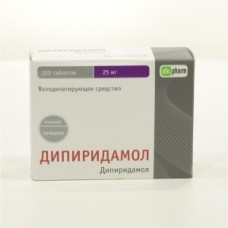Expiration date: 07/2026
Indications:
Treatment and prevention of disorders of cerebral circulation in ischemic type, encephalopathy, prophylaxis of arterial and venous thrombosis and their complications, prevention of thromboembolism after surgery for heart valve replacement, prevention of placental insufficiency in complicated pregnancy, microcirculation disorders of any type (in the complex therapy), prevention and treatment of influenza, SARS (as inductor of interferon and immunomodulator).
Dosing regimen:
The ingestion dose of 50-600 mg/day, reception frequency depends on the indication.
Side effects
From the digestive system: nausea, vomiting, diarrhea.
Of the cardiovascular system: when used in high doses - hypotension, flushing, tachycardia (especially with concomitant administration of vasodilators).
CNS: dizziness, headache.
Allergic reactions: skin rash, urticaria.
Other: myalgia, in some cases, increased bleeding during or after surgery.
Contraindications
Acute myocardial infarction, a common stenosing coronary atherosclerosis, unstable angina, subaortic aortic stenosis, decompensated heart failure, severe hypotension, severe cardiac arrhythmia, bleeding tendency, renal insufficiency, hypersensitivity to dipyridamole.
Application of pregnancy and breastfeeding
Use during pregnancy, especially in II and III trimestrah possible in cases of extreme necessity.
Application for violations of renal function
Is contraindicated in severe renal failure.
Special instructions
To apply caution in patients with hypotension, recent myocardial infarction, congestive heart failure.
There is evidence that at/in the introduction dipyridamole is possible uneven redistribution of blood flow in coronary vessels and the development of the steal syndrome, accompanied by a worsening of angina symptoms (including depression of the ST segment on the ECG). In this regard, it is not recommended in intravenous dipyridamole.
Drug interactions
While the use of tools that reduce the acidity content of the stomach (antacids, histamine H2-receptors (including cimetidine), proton pump inhibitors (including omeprazole) may decrease the bioavailability of dipyridamole.
While the use of anticoagulants, acetylsalicylic acid increases antiplatelet effect of dipyridamole.
While the use of anticholinergic means possible violations of memory and attention in elderly patients.
While the use of beta-blockers described cases of bradycardia and asystole with the use of dipyridamole in patients receiving beta-blockers.
While the application of adenosine increases the effect of adenosine.
While the use of a dobutamine there is a risk of severe arterial hypotension.
While the use of caffeine, other xanthine derivatives dipyridamole decreases efficiency.



